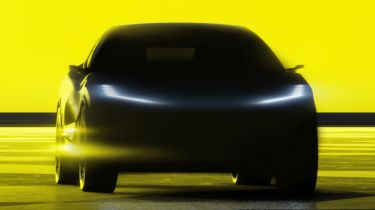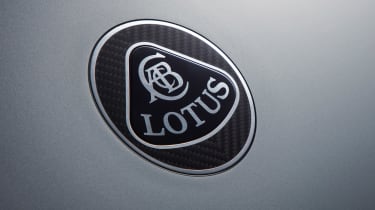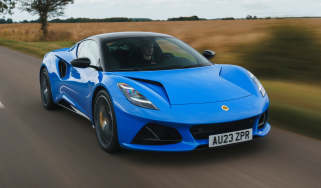Lotus Type 134 electric SUV to undercut Porsche Macan
The as-yet-unnamed Lotus mid-size SUV will be priced from around £55,000 when it goes on sale in 2026

Lotus is gearing up to launch a five-strong electric car line-up by 2027, with the as-yet-unnamed Type 134 mid-size SUV core to the maker’s success. The Porsche Macan rival will use a shortened version of the flagship Lotus Eletre’s platform, and is expected to be revealed later this year.
Speaking with Auto Express from the Lotus London Experience Centre in Piccadilly, chief commercial officer Mike Johnstone confirmed the brand was targeting a starting price of around $70,000 (£55,000) when the car goes on sale in 2026. That would allow it to significantly undercut the base Porsche, which costs from £69,800.
We’ve known a smaller Lotus SUV was headed our way for some time. It was part of Lotus’ plans to launch four EVs by 2026; the first two were the Eletre and Emeya, followed by this as-yet-unnamed ‘D-segment SUV’, then a fully-electric sports car that’ll serve as a replacement for the petrol-powered Emira.
The smaller SUV’s official name remains a closely guarded secret for now, and won’t be announced until much closer to a world debut that’ll take place later in 2024. Lotus has only released one shadowy image of its first mid-size SUV and that reveals little except for the car’s unique headlight design.
Lotus’s chief creative officer, Ben Payne, was on hand at the UK debut of the Emeya to provide us with some exclusive insights into the looks of the brand’s first-ever mid-size SUV.
“[D-segment SUV] is such a large segment. That, in a way, makes this [the Type 134] one of the most difficult products we will do. To really penetrate that segment and achieve high volume, which is what it’s all about, we’re going to have to make a product that’s as broad in its appeal as possible.
“I imagine something that’s probably a little bit more pure in its expression. And we’ve got to balance usability, practicality and performance in that car, but we’ve got to make something unique that stands out. So you’ll see a continuation of this language and this DNA, but the expression of it being evolved and possibly simplified a little.”
He also explained; “we don’t want a cookie cutter approach. We’re going to evolve things and we’ll react to customer feedback, and we’ll react to the perception and changing market trends which evolve very, very quickly now, and we will push this design language forward. But there will be common threads that carry through the designs of the products.”
As such, we expect the Type 134 will feature a similar nose design to the Eletre, Emeya and Emira, which despite their vastly different sizes and purposes, do share some resemblance from the front. The active front grille from the Eletre and Emeya is also likely to be carried over, with the petals opening to help cool the battery and motors underneath, or remaining closed to help improve aerodynamic efficiency. We expect there’ll be other aerodynamic aides at the rear, along with a full-length light bar like those one on its larger siblings.
Mid-size EV crucial to Lotus sales targets
The Type 134 will play a crucial role in Lotus achieving its goal of producing 150,000 cars a year by 2028, with the brand’s Vice President and Chief Commercial Officer, Mike Johnstone, telling Auto Express“ we see [the Type 134] as a real catalyst for the second phase of growth for us.”

The brand is already posting impressive sales results though, taking more orders in September 2023 than Lotus would typically take over a calendar year, and seeing a 43 per cent increase on the previous month’s results in October.
Johnstone also revealed that “we want to price it at around $70,000 as an average globally.” The Porsche Macan EV was the first car that came to Johnstone’s mind when we asked about potential rivals in the segment, but he added “for us, the important thing we want to benchmark it against is our 75 years of history. To make sure that it’s true and exactly what a Lotus should be.
“What we’re seeing is an awful lot of new electrified products being launched into the market in different segments. A lot of them have fantastic architecture including a number of 800V platforms, and there’s great connectivity. So from a technical point of view they’ve got something which is amazing, but sometimes, particularly with the new brands, there’s no real tangible brand to speak of: no soul, no heritage and no history.
“On the opposite extreme, you’ve got a load of performance, heritage brands out there at the moment that maybe aren’t really shifting into electrification at the pace you would expect.
“So for us, the way we can differentiate ourselves from these new EV incumbents coming in is by leveraging the power of the brand. We’ve got 75 years of history, stories and racing pedigree through Formula 1, but for us talking about the spirit of the brand is the thing that’s going to differentiate us in a market that’s going to get increasingly crowded.”
Platform, power outputs and batteries
The Type 134 is expected to utilise a shortened version of the Eletre and Emeya’s ‘Electric Premium Architecture’, which can accommodate wheelbases ranging from 2,998mm to 3,100mm, as well as various battery sizes. The Eletre and Emeya are powered by 112kWh and 102kWh batteries respectively, however the Type 134 could use a smaller unit, potentially around 92kWh in capacity, which is the smallest size the platform was designed for. We also expect the Type 134 to use a dual-motor setup for all-wheel drive, just like its big brother and sister, the quickest of which produces 893bhp and 985Nm of torque.
Whatever battery and motor combination the Type 134 does use, Lotus’s electric-car architecture features an 800V charging system – like the PPE platform that underpins the forthcoming Porsche Macan EV and Audi Q6 e-tron – meaning 10 to 80 per cent top-ups will be handled in under 20 minutes.
We also asked Johnstone about how passionate Lotus fans have reacted to the brand’s shift towards electric cars: “It’s been a bit mixed at times,” he told us. “But lots of people have embraced it. If you look at the first customers who have brought the Eletre, there’s a real high percentage of traditional, hardcore Lotus fans that have an Emira, and they want to drive their Lotus seven days a week, so the Eletre is the perfect complement to that.
“The key thing for us, and what we continue to be laser focused on, is making sure that every electrified product we launch to market is true to the spirit and DNA of what Lotus stands for.”
Contrary to the hysteria around the idea of Lotus EVs that we’ve seen in some circles, Payne also insisted that if Lotus founder Colin Chapman were still at the helm, he’d have embraced EV power: “Look at history, look at F1,” he told us. “[Lotus] was at the leading edge in terms of hardware. Our customers are super-savvy; they need stories. It’s layered up on where the brand has come from.”
Can't wait for the new Lotus? These are the best electric SUVs to buy right now...
Find a car with the experts








